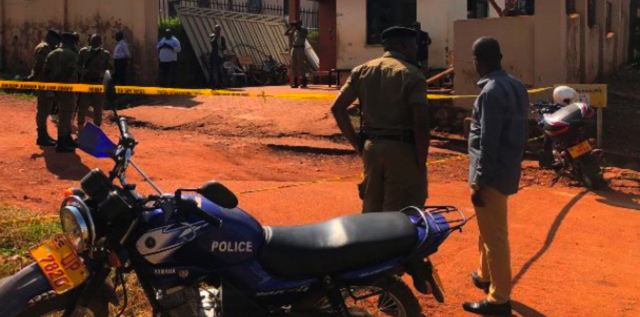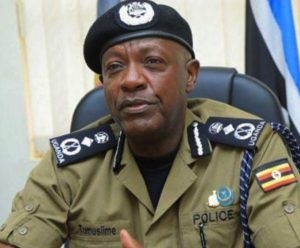
Eyes on Deputy IGP Gen. Katsigazi over attacks on stations
Kampala, Uganda | IAN KATUSIIME | The attack on Kyanja Police Post on the night of Nov. 13 was as daring as they come: assailants riding on motorbikes and firing rounds of bullets at the station with intent of capturing guns. The assailants were repulsed and did not manage to capture any rifle but the attack followed a similar pattern in recent days. With the third attack in four months, the fear and anxiety is palpable.
A fortnight ago on Oct. 31, assailants raided Busiika Police Station in Luweero district, 65km form Kampala. In Busiika, the thugs, numbering six to eight and armed with machetes, hacked two police officers to death and fled with two guns. They left two other police officers injured.
Reports said the assailants dropped one of the guns after the raid leaving residents and authorities wondering about their actual motive.
The Deputy Inspector General of Police Maj. Gen. Geoffrey Katsigazi, paid a visit to Busiika on Nov. 14 where the second attack in three months has confounded residents and exposed security frailties. He met security and area leaders in a general reconnaissance modus operandi.
But Katsigazi’s visit also came at a time of a great debate on a directive from the Commander in Chief, President Yoweri Museveni, to shut down police posts in rural areas and have one major police station at the sub-county level. Katsigazi doubled down on the move.
“The police posts will remain closed. We are not reopening them,” he told journalists after a security meeting in Busiika.
He added, “Some of the police posts had only three personnel and that was very dangerous. We shall now have a minimum of fifteen personnel equipped with motorcycles and other vehicles.”
According to Museveni who mooted the idea in 2019, the police posts lying in rural areas like the one in Busiika were poorly manned; causing vulnerability, security lapses and leading to poor policing in general.
Museveni’s directive to the Police was from a colonial policing model he said he observed in the 1950s. “They (chiefs) would call the tenda (police patrol). I closely monitored it between 1951 and 1958. I could see these people manage huge areas using a skeleton number of police officers,” he narrated in 2019.
At the time, Museveni was responding to Inspector General of Police Okoth Ochola who requested the President for more personnel during a Police Council meeting at Police headquarters in Naguru. The Police are implementing the police mergers three years after the order but it is also a shift from the knee jerk reactions from Museveni in response to dealing with the surge of urban crime in Uganda.
From gun finger printing to banning hooded riders on motorbikes and saying traffic officers should be armed, Museveni has previously lurched from one tactic to another. The President has also taken to admonishing police for outmoded methods of countering urban crime.
At one point during a televised address in 2021, Museveni unveiled a young lady known as Resty Nakyambadde whom he described as a “fighter”. Nakyambadde narrated her encounter with a notorious criminal known as Kiddawalime who broke into her house in Kalungu district. Museveni was reacting to the alarm caused by the near fatal shooting of Gen. Katumba Wamala, a minister and former Chief of Defence Forces (CDF) while the latter was driving to work.

Eyes on Katsigazi
As a result, President Museveni has placed army officers at the helm of the Uganda Police Force since 2001 sidelining career police officers like Ochola. Maj. Gen. Katsigazi follows in that same tradition.
Unlike some of his predecessors who rushed to crime scenes under the glare of television cameras, Katsigazi prefers to operate quietly behind the scenes. He visited Busiika two weeks after the deadly raid on the police post when tensions had tamped down- perhaps in a bid to have calm, reflective meetings with an agitated populace demanding answers.
Katsigazi’s management style is markedly different from his high profile predecessors; Maj. Gen. Sabiiti Muzeyi and Lt. Gen. Paul Lokech, who were well known figures before they were brought into the police force.
They outshined and sometimes undermined IGP Ochola who has been known to preside over police like a provincial governor. Since he was appointed in 2018, Ochola appears to have made peace with Museveni’s command structure where deputies from the military are the de facto police chiefs in the country.
Katsigazi’s most immediate former post was Deputy Commander of Air Force- a relatively new post in the army hierarchy. Appointed at the start of the year, Katsigazi has superintended over the Police with limited media appearance. He is perhaps mindful of the implications of being a very visible police commander in a politically polarised country.
However Katsigazi is not new to policing. He was previously military police commandant. He is also a military man to the core–with a stint as Ugandan Contingent Commander in the peacekeeping mission in Somalia. The 60-year-old has also served as Uganda Peoples Defence Force (UPDF) Chief of Staff for Land Forces.
In an interview with Daily Monitor in April, he said his strategy was centered on coordinating police operations and the level of alertness based on operational readiness of the forces.
“I will ensure that forces are ready to respond whenever called upon to curb crime,” he said. Now the most important part of his promised strategy is under test. The new police chief said the force was enlisting the help of the UPDF and Internal Security Organisation (ISO) in its operations in Busiika.
Busiika, where he is camped, is still reeling from a similar deadly attack in July that resulted in the death of one police officer. The assailants reportedly stabbed two policemen at the road block on the Kampala Gulu Highway at around 1am in Kiwumpa village, five kilometers from Luweero town council and fled with two guns.
Reports said the two assailants armed with machetes attacked the policemen at the checkpoint and stabbed them. The officer who was lucky ran off with stab wounds, hid in a nearby bush and later alerted the Luweero Central Police Station.
Katsigazi and his lieutenants like Fred Enanga, Police spokesperson and Luke Owoyesigyire, Enanga’s assistant in Kampala Metropolitan, have pointed at a rebel group. The rebel group theory has credence for a place like Busiika which lies in Luweero, an area that is largely impoverished, with uninhabited chunks of land. It also still bears scars of the guerilla war that brought Museveni to power in 1986 with some areas deserted as resting grounds for those who lost their lives in the five year war.
But observers have cast doubt on supposed rebel activity being behind an attack on a police station in Kyanja- a fast growing residential suburb in the capital, Kampala.

Leaders speak out
“Those who are in power now know these people because they used similar tactics,” Joyce Bagala, Mityana Woman MP, said on an NTV talk show ‘Ebigambo Tebitta’ on Nov. 5. She was referring to the NRA guerilla tactics which are similar to the ones used by the attacks on police stations.
Bagala represents a constituency not far from Busiika. Residents there are vexed by the growing fears of insecurity and so are their elected representatives. Mityana has had its fair share of attacks on the police and the population. “The way they [authorities] are quick to profile them as rebels says they have a hint,” she added. Bagala also faults the police for disbanding some police posts in Mityana district without consulting her and other MPs in the area.
A day after his Busiika visit, Katsigazi trooped to Mityana and inspected the police station and other security installations in the area. While interacting with their boss, police officers decried the deplorable housing conditions they have endured.
Police have argued that merging police posts is out of personnel shortages but residents where the posts are located have expressed their fears on the potential escalation of criminal activity once the posts are removed completely.
Robert Ssekitoleko, the MP for Bamunaniika County, under whose constituency Busiika falls wondered whether Busiika police station was at the level of a station, while appearing on the same show as Bagala. “The response cannot be adequate when all the officers are sleeping in their respective homes,” he said. Ssekitoleko added that the patrol vehicle which was requested for was in terrible shape and so was the motorcycle at the station.
In short, Ssekitoleko lamented about how understaffed and under-resourced the Busiika station was to respond to such a daring attack. In reality, Busiika is a police post with a handful of officers. It is detached from the level of Luweero police station, not very far off which has an armoury, patrol vehicles and personnel on standby.
Under the new directive, Busiika police station faces closure leaving families of the slain officers and area residents in anguish.
The Uganda Police Force has enormous challenges; the killings in Greater Masaka, motorcycle hit men, armed robberies, rampant guns, and corruption and abuse of office in its ranks. Suspected cells of the Allied Democratic Forces (ADF) causing anarchy in Kampala was until recently a major headache for the police. The police focus on opposition crackdowns has also been one of its obsessions in the last many years hollowing out vital security functions like intelligence gathering and emergency response.
****
 The Independent Uganda: You get the Truth we Pay the Price
The Independent Uganda: You get the Truth we Pay the Price


